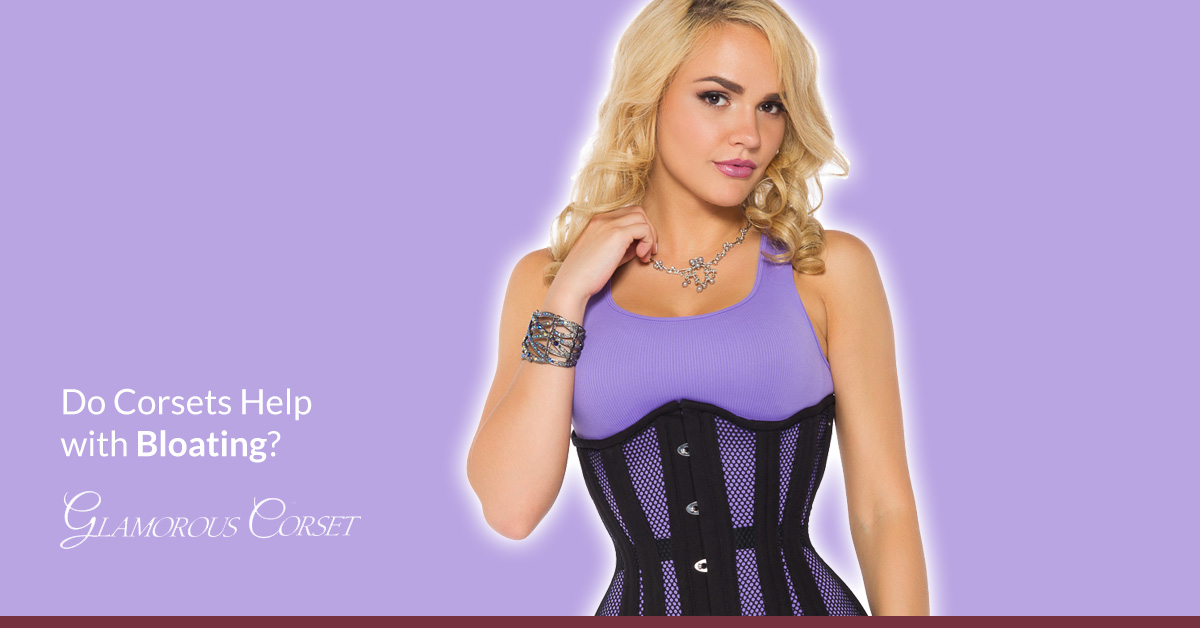Blog
Do Corsets Help with Bloating?
Featured Corset: Jolie Black Mesh Corset
If you’re a woman, chances are you’ve suffered bloating at some point. Most of us deal with it pretty regularly, at monthly intervals. Of course, your diet can also play a role in the abdominal discomfort that results from bloating and gas—just getting real here!
That’s right, ladies. Bodily functions are a reality of life, and the best thing we can do is share information and maybe avoid some gastrointestinal (GI) distress along the way!
When it comes to waist training, which is a daily affair, the last thing you want to deal with is bloating and gas. Maybe you think adding a compression garment like a corset can make a difference. Here’s what you need to know before you cinch up a corset when you’re fighting the battle of the bulge.
How Do Corsets Help with Bloating?
Do corsets help with bloating? In a nutshell, the answer is no. Generally speaking, your abdominal cavity houses your internal organs, as well as some space in between. When your GI tract fills with gas, it can quickly take over empty space and even begin to crowd organs, making your tummy feel like a full balloon. Not comfy.
Unfortunately, this can make it incredibly difficult and even painful to put on a corset, as there is no space for organs to adjust to the compression and contouring of your support garment. However, you can use your entry into the world of waist training as an opportunity to address the root cause of gas and bloating and find ways to curb this uncomfortable condition. It starts with understanding what causes bloating.
What You Consume
Many foods can cause gas and bloating. You’re probably familiar with beans, the magical fruit that makes you toot (P.S. not a fruit). Beans, along with peas and lentils, are legumes that contain high fiber content and complex sugars that can be hard for the body to break down. This is why they cause gas. Luckily, tricks like soaking and adding digestive enzymes can help to curb this occurrence.
Cruciferous veggies like broccoli and cauliflower are also common offenders, and if you have dairy sensitivity or lactose intolerance, the gas and bloating are real. One of the worst culprits, however, is carbonated beverages. Carbonation is associated with carbon dioxide. When you consume it in this form, the carbon dioxide gas in your stomach causes bloating, belching, and gassiness all around.
How You Eat
If you plan to wear a corset on the regular, cutting back on foods that are known to cause bloating is probably wise. However, you should also consider how you eat. If you practically inhale your food, take the time to slow down and chew. The saliva in your mouth helps to break down food for digestion.
Make sure to ingest recommended daily amounts of water, as this is not only ideal for overall health, but it also helps with digestion, circulation, and the production of bodily fluids (like saliva). If you’re planning to change your diet, think about speaking with a nutritionist and taking it slow to avoid undue gas and bloating.
Hormonal Fluctuations
Sadly, there’s not much you can do about the hormonal fluctuations that are part and parcel of your menstrual cycle unless you’re keen to take the birth control pill or other hormone-based therapies (which you can definitely discuss with your doctor). Drinking plenty of water, exercising regularly, and watching your diet could all help.
So, do corsets help with bloating? Pairing compression and bloating is not a recipe for comfort. That said, daily corset wear can make you more aware of how often you experience gas and/or bloating, which can, in turn, give you the chance to better understand and manage your diet to minimize bloating episodes and enjoy greater comfort every day.
To stay up-to-date with weekly blog posts, waist training tips, and the chance to win one of our monthly corset giveaways, follow us on Facebook, Instagram & subscribe to our mailing list today! Want to find the perfect steel boned corset? Shop some of our favorites: underbust corsets, overbust corsets, corset dresses. You can also shop our corsets by material: cotton corsets, denim corsets, leather corsets, mesh corsets, pvc corsets, and satin corsets. Have questions about getting started with waist training or finding the right size corset? Contact us!

My name is Rachel, I am the owner of Glamorous Corset, a small business founded by me in 2010. Back In 2005, I was in a car accident that left me with a herniated disk. Much to my surprise I learned steel boned corsets were beneficial to several medical injuries including mine. I was always intrigued with corsetry, their history and their beautiful aesthetic. I love sharing knowledge about corsets, educating my wonderful readers and breaking the negative stigma related to corsetry. In combination with my years of research and personal experience I hope my articles are useful and can help anyone who has struggled with some of the same things I have. More about me…


